每日观察:关注亚马逊或推移动社交游戏平台等消息(6.29)
1)谷歌Google Play工程主管Chris Yerga最近宣布,Google Play有67%收益来自海外市场而非美国本土;由于采用运营商计费系统,该应用商店在日本和韩国收益同比上年增加14倍,有73%日韩用户通过运营商计费系统付费。
据insidemobileapps报道,独立开发商Robot Invader首席执行官Chris Pruett曾表示,公司游戏《Wind-Up Knight》有60%收益来自Google Play,并且其Android用户付费转换率及ARPU值更高。另一家手机游戏公司TinyCo也报告称旗下游戏在Google Play的ARPU值高于在其他手机平台的盈利性。
2)移动广告平台InMobi最近数据显示,美国有十分之一以上的人口已成为平板电脑用户;29%用户声称自从有了平板电脑,他们就不再阅读纸质书籍;有29%用户称自己使用平板电脑上网的频率已经超过了PC(游戏邦注:其调查样本是9600名受访者)。
有60%用户现在每天使用平板电脑的时间超过30分钟,52%用户用平板电脑打发时间。
55%用户平均每月要用平板电脑进行一次网购,22%用户自称有了平板电脑之后,他们在实体商店购物的频率大为减少。
3)据Kotaku报道,芬兰开发商Rovio最近发布的视频预告片显示,即将面世的《Amazing Alex》玩法将支持玩家创建谜题而非寻找各种方法破解谜题,并将支持玩家与好友分享自己所创造的内容(观察者称这种做法在iOS和Android游戏领域较为罕见)。
4)RIM在最近财报会议上宣布,公司第二季度智能手机出货量为780万部,比上一季度的1110万部下降了30%。与此同时,黑莓PlayBook销量下滑近50%,出货量仅为26万部。
黑莓全球用户达7800万,略多于2011年9月份时的7000万;主要用户增长来自亚洲、中东和欧洲市场。
5)据techcrunch报道,RIM最近发布的2013财年第一季度财报显示,公司基于GAAP的收益为28亿美元,净亏损达5.18亿美元(其2012财年第四季度收益为42亿美元,净亏损为1.25亿美元)。
此外该公司还宣布首款BlackBerry 10智能手机发布时间将推迟至2013年第一季度,并计划在业务重组中裁减5000个岗位。
RIM近日股票已跌至每股8.87美元,接近数天前的8.83美元。
6)据彭博社报道,有匿名知情者透露亚马逊正在研发运用于Kindle Fire的游戏社交功能,该公司将在7月底向Kindle Fire游戏推出这些社交功能。
观察者称亚马逊这种服务理念类似于苹果Game Center,该公司最近正加紧招贤纳士以开发自己的平台,亚马逊可能将效仿GREE和DeNA做法,与之角逐手机社交游戏平台市场。
7)谷歌Android产品管理总监Hugo Barra最近表示,为弥补Android平台分裂性问题,从Android 4.1版本(Jelly Bean)开始,谷歌今后推出新Android操作系统版本之前两三个月,将提前向指定设备制造商发布Android平台开发者工具(Platform Developers Kit,简称PDK)。
据谷歌内部数据显示,目前有65%的Android设备运行的是Gingerbread操作系统(Android 2.3.3版本),而该版本早在2011年2月份时就已发布。仅有7%设备运行的是最近的Ice Cream Sandwich操作系统版本。
8)Distimo最近发布报告称,从2011年5月至2012年5月,App Store前200名iPhone应用收益增长速度位居前10名的市场分别是日本、俄罗斯、中国、台湾、泰国、巴西、墨西哥、韩国、土耳其、加拿大;其中日本市场收益同比去年增长560%,俄罗斯为115%,中国是109%。
从iPad应用收益来看,俄罗斯、巴西、墨西哥、土耳其自2011年9月以来收益增幅介于76%至91%。俄罗斯市场的Google Play在此期间收益增幅为250%,超过美国市场的两倍。
目前面向俄罗斯用户的iPhone应用在App Store中仅占比4%,但在前200名营收应用榜单中却有70%收益来自转换为俄语版本的应用。
自2012年4月向巴西用户开放游戏服务以来,苹果iPhone平台App Store收益在一个月内增长超过80%,使巴西成为南美最大的应用市场。
在俄罗斯,“书籍”是收益排名第四的应用类型;但在巴西和土耳其,“书籍”则是最不成功的应用类型。
付费应用在土耳其鲜有市场,其免费应用与付费应用下载比例为100:2。
在土耳其和俄罗斯App Store,含IAP功能的免费应用创造了半数以上收益。但在墨西哥和巴西,发布不含IAP的付费应用才是最成功的盈利模式。(本文为游戏邦/gamerboom.com编译,拒绝任何不保留版权的转载,如需转载请联系:游戏邦)
1)67% of all Google Play revenue comes from outside the U.S.
Kathleen De Vere
67 percent of all revenue generated by Google Play comes from outside the U.S. according to Chris Yerga, Google’s engineering director for Google Play.
Yerga shared the numbers as part of his presentation Android Apps in Google Play, during the I/O conference in San Francisco today, emphasizing how revenues have increased in countries like Japan and Korea. Google Play revenue in the two countries increased 14 times year-over-year, largely thanks to carrier billing. 73 percent of users in Japan and Korea pay for apps through carrier billing.
Google’s official numbers match what we’ve heard from independent developers like Robot Invader. In May Robot Invader CEO Chris Pruett told us his game Wind-Up Knight makes 60 percent of its revenue through Google Play, and Android users have higher conversion rates and ARPU. Pruett credits his app’s success on Google Play to access to carrier billing. In today’s I/O keynote Google announced it will expand direct billing to more than a dozen carriers.
In-app billing has also been a success for certain developers, said Yerga. He shared a slide with a testimonial from TinyCo, which reports its average revenue per paying user (ARPU) is higher in Google Play than any other app store.(source:insidemobileapps)
2)Tablet userbase nearing 30 million in US, claims InMobi
by James Nouch
More than tenth of the US population now own tablets according to data released by ad network InMobi, with almost 30 million people changing the way they consume media as a result.
The firm claims the impact of tablets now stretches far beyond gaming habits, with 29 percent of users claiming to have stopped reading print books, while a further 29 percent now use tablets over laptops and PC to surf the web.
Getting tight with tablets
Said results are pulled from a survey of 9,600 correspondents in a survey conducted in conjunction with mobile marketing outfit Mobext.
The results show that 60 percent of tablet owners now use their devices for more than 30 minutes each day, with 52 percent using them to fill what would otherwise have been ‘dead time.’
Tablet adoption has also changed the way that Americans shop.
55 percent of tablet owners will make a purchase on their device in an average month, and 22 percent of users say that, since purchasing their device, they shop at physical stores less frequently.
Converging on mobile
“We are seeing a radical, steady shift from all other media channels to mobile – and so much of this momentum is owed to the transformative experiences connected devices are providing mobile consumers,” explained Anne Frisbie, InMobi VP and MD of North America.
“We need to continue to look at mobile as a new channel that requires innovative ways of engaging with consumers while they are online at home or away from their desks as mobile continues to transform media consumption and shopping.”(source:pocketgamer)
3)Meet Amazing Alex, Rovio’s cool, calm and collective kid [Video]
by Joe Osborne
The Angry Birds have always had a chip on their shoulders. They’re way to quick to freak out and blow things up. (It’s just a couple of eggs, guys–your ladies pump those out on the daily.) But Amazing Alex, developer Rovio’s first original–well, sort of–game since Angry Birds likes to play it zen. He’s more about building cool things rather than breaking them down.
Rovio released the following teaser trailer to show just that. Unfortunately, that’s all this is: a teaser trailer. But we can gather quite a bit from that, like that Amazing Alex will probably be a much calmer game than Angry Birds. Players will build puzzles instead of finding the most efficient ways to break them down. And that sounds very, very interesting to us.
We know, this is basically Casey’s Contraptions–but according to Kotaku, players will be able to share their own creations with friends. That’s something that Rovio hasn’t done before, and–correct us if we’re wrong–few game makers have done on iOS and Android. That too is very, very interesting to us.(source:games)
4)RIM Ships 7.8M Smartphones In Q1 2013, Down 30 Percent From Last Quarter’s 11.1M
Jordan Crook
It’s been a bleak call, thus far.
We just heard on RIM’s Q1 2013 earnings call that the Waterloo-based company only shipped 7.8 million smartphones this quarter, which is down 30 percent from 11.1 million units shipped last quarter.
Though the BlackBerry Bold continues to be a strong product, fierce competition from both Android vendors and the staggering iPhone 4S numbers only took the company further into its hole of despair.
Hopefully, BlackBerry 10 will reignite consumer enthusiasm, though unfortunately the new mobile OS is a bit delayed. Moreover, RIM itself admits that BlackBerry isn’t for everyone.
In related news, BlackBerry PlayBook sales are down almost 50 percent, with just 260,000 units shipped.(source:techcrunch)
RIM Hits 78 Million BlackBerry Subscribers, Up From 70 Million In September 2011
Jordan Crook
Today on RIM’s Q1 2013 conference call, CEO Thorsten Heins admitted that “this was a challenging quarter for the company,” but announced 78 million subscribers with “churn remaining high.” He admitted particular success with the BlackBerry Bold product.
For a little context, RIM hit 70 million global subscribers all the way back in September of 2011.
Subscriber base grew in Asia, Middle East and Europe, particularly. He also mentioned that U.S. revenue has stabilized, though the outlook for the next few quarters is “very challenging.”
Along with the subscriber update, Heins announced 260,000 PlayBook shipments, and said that new versions of the PlayBook are on the way. Regarding BB10, it’s on its way in Q1 2013. “I will not deliver a product to the market that is not ready for our customers or doesn’t have the outstanding user experience that I expect Blackberry to have. I will not compromise on this issue,” he said. (source:techcrunch)
5)RIM’s Q1 2013 Results: $518 Million Loss On $2.8 Billion In Revenue, BlackBerry 10 Launch Pushed To 2013
Chris Velazco
RIM has just released their fiscal Q1 2013 financials, and they’re about as bleak as the company expected. The Canadian company reported a net GAAP loss of $518 million (which breaks down to $0.99/share diluted) on revenues of $2.8 billion.
To put that in a bit of perspective, RIM reported a net loss of $0.24/share diluted (or $125 million) on $4.2 billion in revenues in Q4 2012. Meanwhile, analysts expected RIM to report a net loss of $0.03/share on revenues of $3.1 billion in the days leading up to the release.
The company also reported that despite their longstanding claims to the contrary, the first BlackBerry 10 smartphone isn’t expected to see the light of day until the first quarter of calendar 2013.
“RIM’s development teams are relentlessly focussed on ensuring the quality and reliability of the platform and I will not compromise the product by delivering it before it is ready,” said CEO Thorstein Heins.
The news comes as a huge blow to BlackBerry devotees who believed the company when they originally announced their “late 2012″ launch window. As the company continues woo developers to their platform, they’re now faced with an even bigger challenge — keeping potential customers interested in a final redemptive product that will be even later to market than expected.
RIM also noted that they shipped 7.8 million BlackBerrys and roughly 260,000 BlackBerry PlayBooks. For those keeping track, the company shipped 11.1 million BlackBerrys and “over” 500,000 PlayBooks in the previous quarter.
Though their financials don’t paint a rosy picture for the company, the news doesn’t come as much surprise. The beleaguered Waterloo smartphone maker temporarily halted trading on May 29 to issue a “business update” in which they warned of an operating loss this quarter because of a particularly rough transition period.
They declined to delve into more specifics, as the company had announced earlier in the year that they would no longer provide quantitative financial guidance — perhaps not the most confidence-inspiring thing RIM has ever done. Of course, there have been plenty of other events in RIM’s recent history that fail to paint a rosy picture for their future — for example, its tough to say whether or not their recent layoffs portray a company making itself leaner and more focused, or just desperate to save money. All we can say for certain is that those layoffs will continue, as RIM has revealed that they plan to cut 5,000 jobs as part of their reorganization.
On that note, shareholder confidence in the company was seemingly shaken today as well — at one point during trading RIM’s stock price dipped to $8.87 per share. While the stock managed to recover toward the end of the day, it was still terribly close to the 52 week low of $8.83 it hit a few days ago. Even though their stock hasn’t hit a new low, this is territory that would’ve been completely unheard of for them at any other point in the past five years.
As usual, RIM will be conducting an earnings conference call at 5PM ET, and we’ll be listening in for any new developments.(source:techcrunch)
6)Will the Kindle Fire get its very own Game Center-killer?
by Joe Osborne
That’s the word on the street, according to Bloomberg and its anonymous sources. The news website reports that Amazon is working on social features to incorporate into games on its hot Kindle Fire tablet. Sources tell Bloomberg that, by the end of July, game makers will be able to add social features into the games they create for Kindle Fire easily.
Of course, that will be thanks to the efforts of Amazon’s growing games division, which hasn’t been much of a secret for those keeping score. Speaking of which, players will likely be able to do exactly that through these social features for Kindle Fire as well as earn achievements and other awards while playing.
That sounds a lot like Amazon’s very own Game Center–Apple’s proprietary social gaming network for iOS and soon Mac computers. “Amazon has been hiring a lot of folks in games, both developers and people to help grow their platform,” Robert W. Baird & Co. analyst Colin Sebastian told Bloomberg. “Third-party developers are also warming up, because monetization is better on Fire than other Android devices.”
With companies like GREE and DeNA hot on their own mobile social gaming networks for Android as well as iOS, it would make sense for Amazon to want to be the leader in that department. (Kindle Fire is an Android-based device.) But will it be able to compete with Game Center in terms of features? We’ll see soon enough … or not.(source:games)
7)Google rolls out Android PDK with an eye to fixing fragmentation issues
Kathleen De Vere
Google is looking to fix Android’s platform fragmentation by giving device manufacturers earlier access to upcoming versions of the Android OS. Starting with Android 4.1 Jelly Bean, selected OEMs will receive a Platform Developers Kit (PDK) two to three months before a new version of Android is released.
Hugo Barra, Android’s director of product management said the new Android PDKs were essentially SDKs for device manufacturers — giving Google hardware partners an opportunity to get a jump on making sure new features are compatible with their devices before the a version of the OS is actually released.
It’s no secret that some Android OEMs haven’t put much effort into making sure their hardware is compatible with the latest version of the Android OS. According to Google’s own developer dashboard, 65 percent of Android devices are running Gingerbread, or Android version 2.3.3, an update that came out in Feb. 2011. Only seven percent of Android devices are running the most recent version of the Android operating system, Ice Cream Sandwich.
Although the announcement won’t close the gap between when a new version of Android is released and when the majority of Android users actually see it on their phones, the move will be a welcome one for the Android developers who have to design apps that are capable of running on one of the myriad versions of the Android OS currently in use.(source:insidemobileapps)
8)Emerging App Markets: Russia, Brazil, Mexico and Turkey
by Hendrik Koekkoek
Exactly one year ago we wrote a publication about the rise of the application market in a number of East Asian countries. Over the course of the past year the application market in those same East Asian countries continued to grow at a high pace, while at the same time other markets also started to adopt smartphones. We analyzed the application market in the top 30 countries over the course of the past year in terms of revenue, and found four emerging countries to be especially interesting: Brazil, Mexico, Russia and Turkey. All developers that develop for multiple markets should keep an eye on these countries, as they showed strong growth during the past year, and are likely to continue or even accelerate their growth.
This report covers four of the top growth markets for applications: Brazil, Mexico, Russia and Turkey. All revenue data in this report covers the revenues generated by the top 200 highest grossing applications, unless otherwise noted. The analysis is limited to the 30 countries that have generated the most revenue during May 2012.
The major findings are:
•Excluding the East Asian countries, Russia, Brazil, Mexico and Turkey are the fastest growing markets in terms of revenues generated in the Apple App Store for iPhone with yearly growth rates that range between 54% and 115%.
•The growth in app revenue in Russia, Brazil, Mexico and Turkey since September 2011 ranges between 76% and 91% in the Apple App Store for iPad. For Russia, the growth in revenue in Google Play is 250% – more than twice the growth rate of the US.
•Only 4% of all apps in the Apple App Store for iPhone are available in Russian, however, 70% of the revenue from the 200 top grossing apps is generated by apps that are translated into Russian.
•Since games became available in April 2012 in the Apple App Store for iPhone in Brazil, the revenues increased by more than 80% in one month alone, making Brazil the single largest app market in Latin America.
•The preferences for types of apps differ largely per country. In Russia, the Books category is a top four category in terms of generated revenue. In Brazil and Turkey, the Books category ranks among the least successful type of applications.
•Paid apps are not popular in Turkey: only 2 paid apps are downloaded for every 100 downloaded free apps.
•More than half of the revenue is generated by free apps with in-app purchases in Turkey and Russia. Alternatively, in Mexico and Brazil, paid apps without in-app purchases is the most successful business model. purchases is the most successful business model.(source:distimo)




























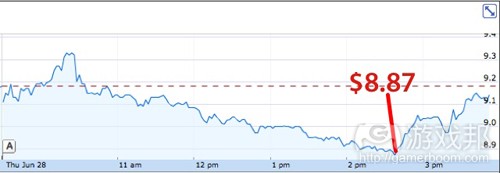
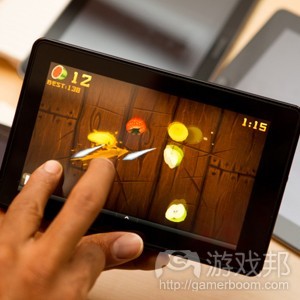
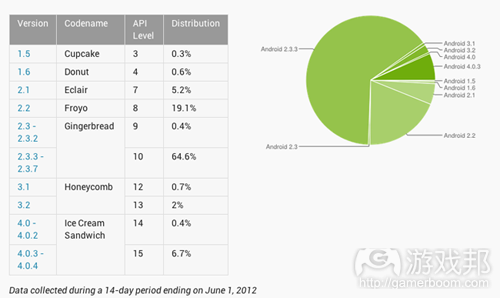
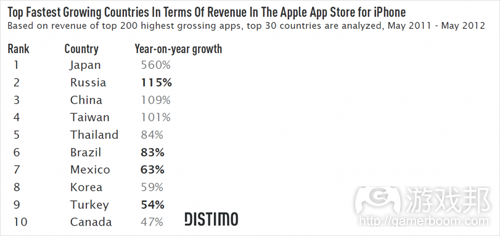
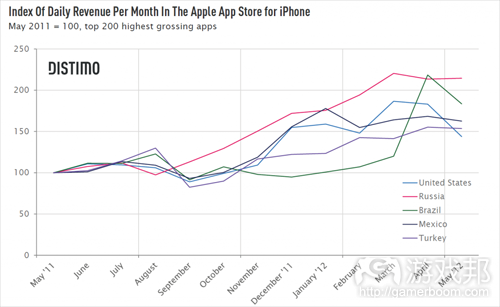
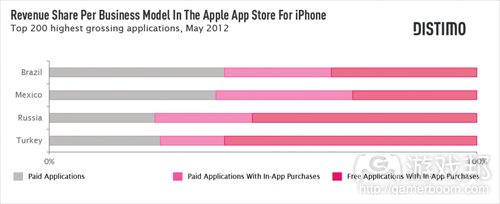














 闽公网安备35020302001549号
闽公网安备35020302001549号